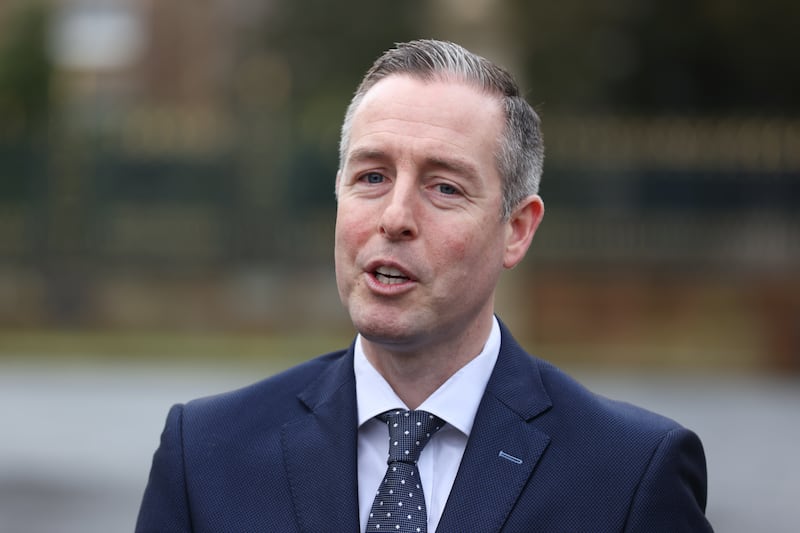Stormont’s Education Minister has warned school governors he will no longer permit them to ignore guidance on reducing uniform costs as he revealed a price cap is under consideration.
Paul Givan said he does not favour getting rid of school uniforms, insisting such a move would be a retrograde step, but he said he will be taking steps this year to ensure they are more affordable.
Mr Givan said proposals due to go out for public consultation later in the spring will include the beefing-up of current departmental guidance by putting it on a statutory footing and the introduction of a price cap on uniform costs.
The DUP minister was addressing the Assembly during a debate raising concerns about the impact of school uniform costs on hard-pressed families.
Sinn Fein’s motion proposed the introduction of statutory guidance compelling schools to ensure uniform costs are kept affordable, while an amendment tabled by the Alliance Party called for the introduction of a price cap.
Responding to the debate, Mr Givan signalled his openness to both proposals.
The minister also said he wants to review the criteria for accessing support grants to help families with uniform costs.
On the potential for a price cap, Mr Givan said: “There is no price cap in place anywhere in these islands. That doesn’t mean we shouldn’t do it. I believe it is something that we should be looking at.
“And that’s why it will be part of the consultation that I will be putting forward in terms of the introduction of a price cap, because we do need to look at this issue.”
The minister voiced frustration that some schools are not following his department’s guidance on uniform costs.
“School governing bodies are responsible for setting their own school uniform policy and my department has issued guidance to support schools in setting that policy, but that guidance is only of assistance if it is followed by schools,” he said.
“The current guidance makes it clear that, in setting their uniform requirements, schools should ensure they represent value for money and it recommends that schools enable uniform costs to be as low as possible through minimising branded items and ensuring items are available from a number of retailers.
“And it is important to put on record the fact that many schools have followed this guidance and I welcome that. However, it also has to be said that there are other schools which have not. That is not a situation which I am going to permit to continue.
“Pending any longer-term decisions, my overarching aim in this area is to ensure that all school governing bodies put affordability, comfort, sustainability and best value at the core of their decision-making when they set their school uniforms requirements.
“I want to ensure uniform policies are transparent and have been developed with the input and support of parents and children.
“In doing so this has the potential to make lives easier for both children and parents by reducing the burden of the costs of attending school.
“We must ensure that the cost of uniform is not a barrier to children accessing education.”
Mr Givan said a pre-consultation exercise conducted by his officials had highlighted a “wide variation” in uniform policies between different schools.
He cited the example of a girl’s blazer at post-primary school level costing £50 at one school and in excess of £120 at another.
“The costs associated with uniforms should never be a barrier to what school you go to,” Mr Givan added.
“And sadly for some parents it is a consideration that they’re having to take into account. I believe that’s wrong and we need to make sure that there isn’t any barrier in place when it comes to what school you go to.”

Sinn Fein MLA Pat Sheehan, who proposed his party’s motion, said families worst hit amid the cost-of-living crisis are those most affected by the high price of uniforms.
He said some schools have items on their required uniform lists that are “totally unnecessary”.
“Some boards of governors direct parents to use a single supplier of uniforms, which means parents don’t have the opportunity of competitive pricing, leaving no choice of purchasing cheaper alternatives in the High Street,” Mr Sheehan added.
“Moreover, some schools, particularly but not exclusively in the grammar sector, insist on branded PE clothing. And this not only adds additional expense, but also acts as a barrier to some young people attending particular schools. Because parents know the cost of uniforms and PE gear would be beyond their reach.
“Schools should be adopting a uniform policy that aims to make uniforms as affordable as possible and avoids expensive add-ons.”
Alliance MLA Nick Mathison, tabling the amendment, said a cap would be a “meaningful step” to drive down costs.
“We don’t believe that words and aspirations are going to be enough any longer because, regrettably, boards of governors have not complied with the guidance in many instances,” he said.
“And the learning from England unfortunately suggests that the statutory guidance that was introduced in that jurisdiction has not been complied with either, and that students are facing the same costs and families are facing the same pressures.”
Sinn Fein’s motion and the Alliance amendment, both of which were non-binding, were both passed by way of oral vote after the Assembly debate with no dissenting voices.









